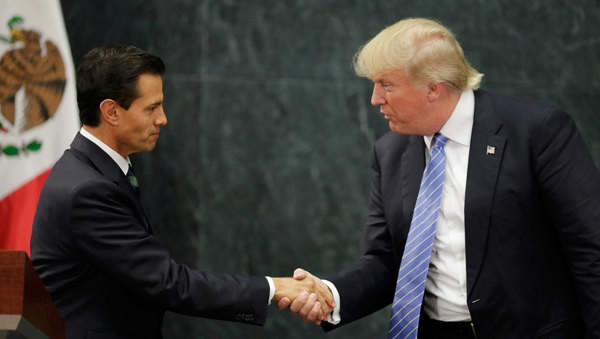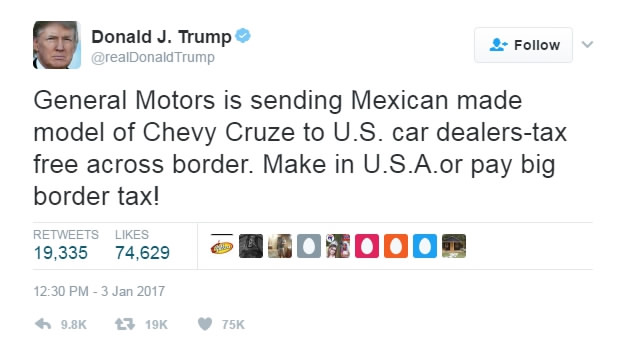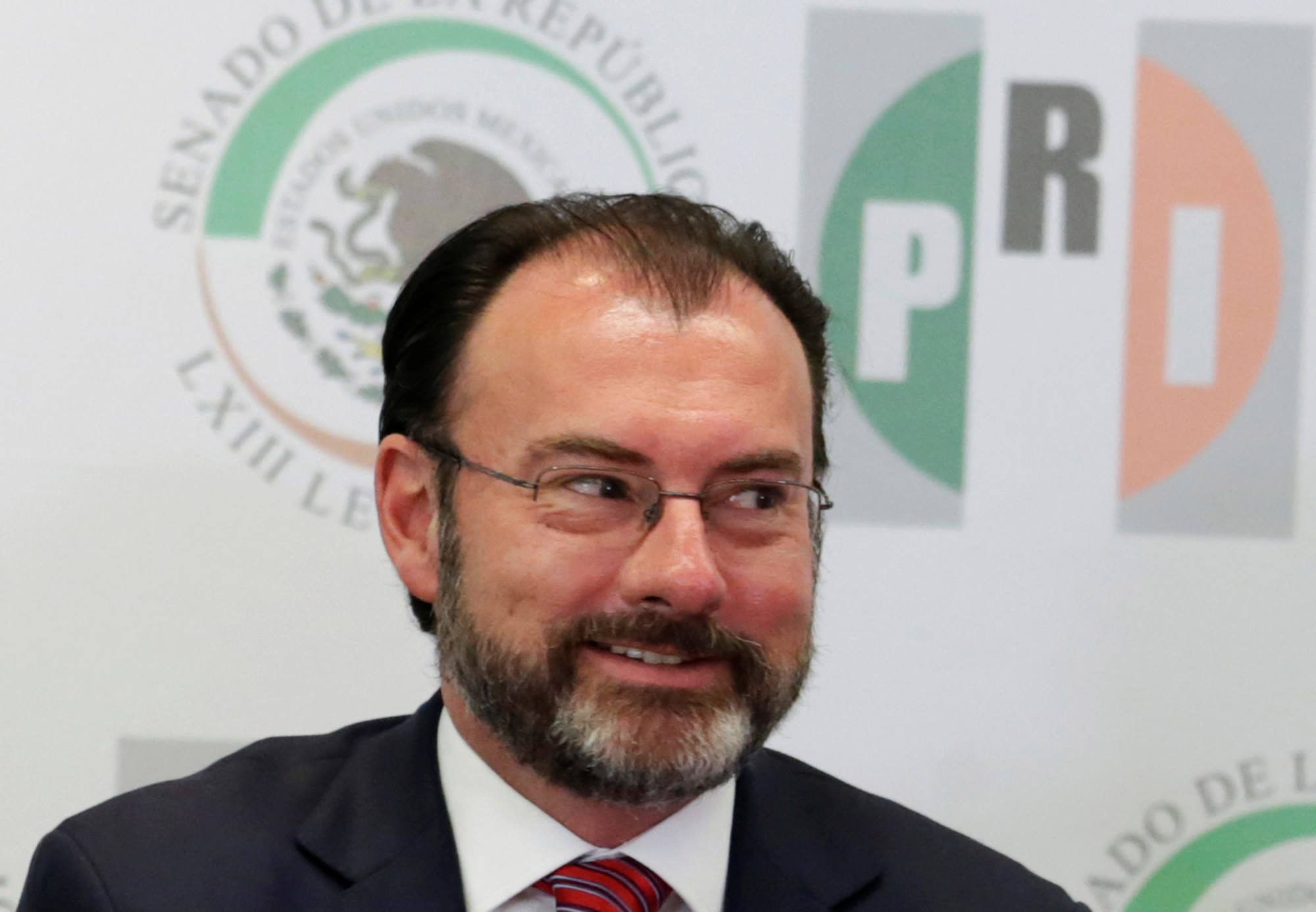
Business
16:39, 02-Feb-2017
China steps into Mexican auto industry as US uncertainty grows
Updated
10:39, 28-Jun-2018

Donald Trump engaged in a war of words with Mexico throughout his campaign for the US presidency, and the torrent of tweets hasn’t slowed in the days since he took office.
An executive order was signed calling for the construction of a border wall between the countries, a border tax of 20 percent was mooted and the North Atlantic Free Trade Agreement (NAFTA) – a free trade deal between the US, Mexico and Canada - is under threat.

Donald Trump held a press conference with Mexican President Enrique Peña Nieto on August 31, 2016, but future relations between the countries are uncertain. /China Daily Photo
Donald Trump held a press conference with Mexican President Enrique Peña Nieto on August 31, 2016, but future relations between the countries are uncertain. /China Daily Photo
US trade is vital to Mexico, making up over 81 percent of the country’s exports in 2015 according to the World Bank. And since the implementation of NAFTA under the Clinton administration, the car manufacturing industry has grown rapidly. Vehicles are now Mexico’s biggest export.
Mexico, Trump and an uncertain car industry
Automakers from around the world have flooded into Mexico to build vehicles for domestic and international buyers – but with a particular eye on the easy access to the US market.
With the Trump administration’s threat to impose a 35 percent tax on cars made in Mexico and sold in the US, uncertainty reigns in a key part of the Mexican economy.
NAFTA currently allows goods to move between the US, Canada and Mexico without any tax, but Trump has warned that he will either renegotiate or end the agreement, which he has derided as “the worst trade deal maybe ever.”
And in the weeks before his inauguration, he threatened US automakers with plants in Mexico with additional taxes.

Donald Trump's threatens General Motors with a "big border tax." /Twitter Screenshot
Donald Trump's threatens General Motors with a "big border tax." /Twitter Screenshot
Ford canceled a 1.6 billion US dollar factory in the northern state of San Luis Potosi. He also threatened General Motors with a “big border tax” over its manufacture of cars in Mexico.
China strikes deal to build SUVs in Mexico
US automakers are far from the only players in Mexico - General Motors, Ford and Chrysler all have plants in the country, but Volkswagen, Mercedes, Nissan and Kia have major operations.
China’s FAW Group was the country's first automaker to operate a plant in Mexico, and now, as Chinese investment in the country steps up, a 212 million US dollar deal to assemble Chinese cars in the country has been announced.

Giant Motors Latinoamerica and Chinese automaker JAC Motors will manufacture two SUV models in the Mexican state of Hidalgo. /China Daily Photo
Giant Motors Latinoamerica and Chinese automaker JAC Motors will manufacture two SUV models in the Mexican state of Hidalgo. /China Daily Photo
Wednesday’s deal between Giant Motors Latinoamerica and Chinese automaker JAC Motors will lead to the manufacture of two SUV models, and potentially an electric vehicle, in the state of Hidalgo.
AP reports that the vehicles are initially aimed at the Mexican market, but there are hopes of distributing elsewhere in Latin America in the future. Hidalgo Governor Omar Fayad said the plant will begin with a capacity of 11,000 vehicles annually, with output ultimately rising to 40,000. The initial phase of the project is expected to create 1,000 direct and 4,500 indirect jobs.
"This automobile will proudly carry a label that will say 'Made in Mexico,'" Fayad said, "and that should be a cause for great pride for the people of Hidalgo."
Fayad called the deal a step down "a road toward the diversification of exports alternative to the United States."
China and Mexico
China was Mexico’s third-largest trading partner in 2015 according to the World Bank, but the data also displays the importance of the US to the country. Exports to the US made up 81.24 percent of Mexico’s exports that year.
Mexico is taking steps to enhance trade ties with countries around the world in the wake of Trump’s election. The European Union and Mexico on Wednesday announced two new rounds of trade talks in the first half of 2017.

Mexico's Foreign Minister Luis Videgaray speaks about trade with the US in Mexico City on January 30, 2017. /CFP Photo
Mexico's Foreign Minister Luis Videgaray speaks about trade with the US in Mexico City on January 30, 2017. /CFP Photo
The country’s Foreign Affairs Minister Luis Videgaray said on Monday that Mexico is eager to further strengthen comprehensive ties with China and attract investment in the coming years.
"We want to attract investment and continue to strengthen our ties with China in a comprehensive way," Videgaray told senators, according to Xinhua.
"Regarding China, we have to remember that it is a country with which we have elevated our relationship, the character of our comprehensive strategic partnership, and we are seeing an increase in the flow of trade.”
Chinese foreign direct investment in Mexico has been comparatively low in recent decades, but the deal to make Chinese SUVs in the country could be just the first step as countries seek to fill the vacuum in the Mexican economy the US looks likely to create.

SITEMAP
Copyright © 2018 CGTN. Beijing ICP prepared NO.16065310-3
Copyright © 2018 CGTN. Beijing ICP prepared NO.16065310-3